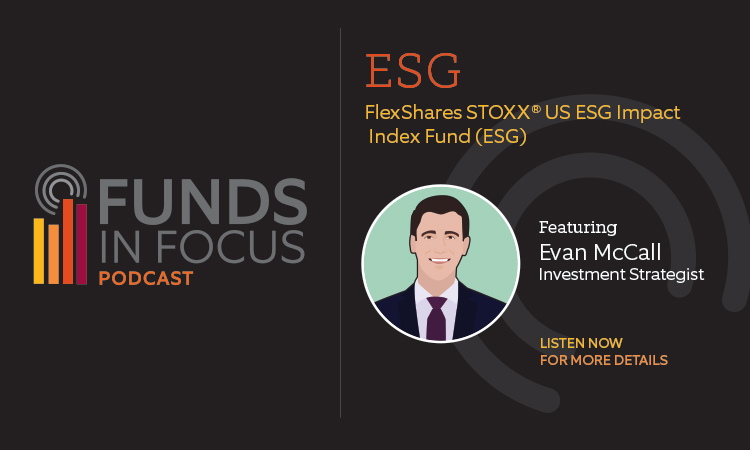The rise of environmental, social, and governance (ESG) strategies has been one of the most noteworthy investing trends of the past decade. But how has the global pandemic impacted its rising trajectory?
In our latest Funds in Focus podcast, we spoke with Investment Strategist Evan McCall to get his perspective on ESG, and came away with three key takeaways:
In this episode, you'll learn
- What is ESG (environmental, social and governance)
- The conditions of the ESG space before COVID-19
- The recent developments in ESG
- What may happen to ESG going forward
TAKEAWAY #1: WHAT’S IN A NAME?
What’s now most commonly known as ESG investing has been given a variety of labels over the years. Sustainable investing, socially responsible investing, or SRI are just a few names that comprise the alphabet soup of variations on the theme.
However, it’s important to recognize that these strategies could have varying objectives. For example, some investors may be looking for ways to align their portfolios with their personal values, while others may be viewing the strategies as a framework to evaluate a company’s sustainability to assess a stock’s long-term performance and risks.
With these varying objectives can come different approaches to incorporating ESG considerations into portfolios. ESG indexes can be constructed using negative screens, where certain companies—such as oil or tobacco companies—are excluded based on their business lines or practices. Alternatively, index construction methodology can take a more proactive approach and include companies that meet certain criteria, such as corporate board diversity or green practices. As such, investors can decide which approach is right for them based on what’s most important to them.
TAKEAWAY #2: THE PANDEMIC HAS ACCELERATED THE ESG TREND
For the past several years, ESG has been garnering significant attention around the globe. Initially the interest was primarily from younger investors looking to align their portfolios with their values, but ESG adoption has since extended beyond millennials. More recently, we’ve observed a broader client base using the strategies alongside more traditional investment approaches.
While the pandemic has negatively impacted some areas of the market, it has only accelerated the ESG trend. For one, it’s led to heightened emphasis on employee health and work-from-home policies. Also, many have observed the environmental impact of quarantine and stay at home orders on air quality, bringing global emissions concerns to the forefront. And the pandemic has coincided with a broader societal emphasis on racial equity and renewed US commitment to green policy under the new Biden administration—both significant tailwinds for ESG strategy growth.
The growth of ESG is evident in recent fund flows. ESG funds brought in record flows of $20.6 billion in 2019 and shattered yet another record in 2020 with $51 billion in inflows. Looking ahead, experts are projecting ESG assets to reach more than one third of global assets under management in 2025.
TAKEAWAY #3: THE MYTH OF THE ESG PERFORMANCE TRADEOFF
Since the dawn of ESG investing, many have raised concerns that incorporating ESG considerations into portfolios would come at the sacrifice of performance. This belief took root in the early days of ESG, where strategies were primarily focused on sweeping exclusions that could at times could compromise diversification or result in high tracking error.
However, more contemporary ESG approaches can potentially correct for these shortcomings—and have proven the ESG performance tradeoff to be a myth. For example, our FlexShares STOXX® US ESG Impact Index Fund (ESG) and FlexShares STOXX® Global ESG Impact Index Fund (ESGG) are designed as broadly diversified core equity strategies covering the US and global developed markets. The funds are constructed emphasizing a set of ESG key performance indicators that we select to potentially reduce risk at the security level.
Performance for both of these funds indicate that investors didn’t trade off ESG for returns. If we look at the three year and since inception periods for ESG* and ESGG*, we see both the US and global strategies outperform their respective non-ESG policy benchmarks.
*Click the above links for each fund’s standardized performance as well benchmark returns.
Looking ahead, we expect ESG growth to continue on its trajectory. And as demand for these strategies continues to accelerate, we expect to see the ESG landscape further evolve as new tools are developed to define and measure more elements of E, S, and G investing.
IMPORTANT INFORMATION
Before investing, carefully consider the FlexShares investment objectives, risks, charges and expenses. This and other information is in the prospectus and a summary prospectus, copies of which may be obtained by visiting www.flexshares.com. Read the prospectus carefully before you invest.
Foreside Fund Services, LLC, distributor.
An investment in FlexShares is subject to numerous risks, including possible loss of principal. Fund returns may not match the return of the respective indexes. A full description of risks is in the prospectus.
FlexShares STOXX® US ESG Impact Index Fund (ESG) is passively managed and uses a representative sampling strategy to track its underlying index. Use of a representative sampling strategy creates tracking risk where the Fund’s performance could vary substantially from the performance of the underlying index along with the risk of high portfolio turnover. The Fund is subject to environmental, social and governance (ESG) Investment Risk, which is the risk that because the methodology of the Underlying Index selects and assigns weights to securities of issuers for non-financial reasons, the Fund may underperform the broader equity market or other funds that do not utilize ESG criteria when selecting investments. The Fund is also at increased risk of industry concentration, where it may be more than 25% invested in the assets of a single industry. The Fund may also invest in derivative instruments. Changes in the value of the derivative may not correlate with the underlying asset, rate or index and the Fund could lose more than the principal amount invested.
The STOXX® USA ESG Impact Index is the intellectual property (including registered trademarks) of STOXX® Limited, Zurich, Switzerland and/or its licensors ("Licensors"), which is used under license. The securities based on the Index are in no way sponsored, endorsed, sold or promoted by STOXX® and its Licensors and neither of the Licensors shall have any liability with respect thereto.

